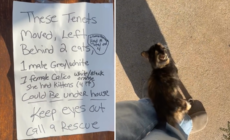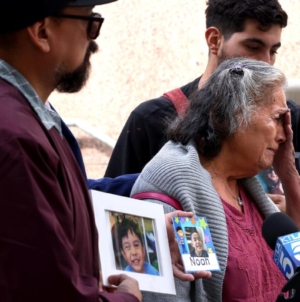-
Can this historic California lighthouse be saved from storms and neglect? - 10 mins ago
-
Deion Sanders Doesn’t Hold Back After Colorado’s Historical Loss - 15 mins ago
-
Sudanese Paramilitaries Claim Control of Key Army Garrison in Darfur - 19 mins ago
-
Heartbreak Over Note Taped to Door As Tenants Move—but Leave Pets Behind – Newsweek - 50 mins ago
-
Senior politicians discuss the Democratic Party youth movement - 51 mins ago
-
Trump Leans Into Showmanship on Day 1 of His Asia Trip - about 1 hour ago
-
Trump: 'I Don't Need' to Solve Afghanistan-Pakistan Conflict, But Will - about 1 hour ago
-
‘It’s still smoldering.’ A hiker’s video of Palisades fire raises questions about state’s responsibility - 2 hours ago
-
Halloween Season Is Here. Bring on the Horror. - 2 hours ago
-
Dog Back at Rescue for 2nd Time—Rescuers Can’t Believe the Change - 2 hours ago
California lawmakers push to protect immigrants at schools, hospitals

SACRAMENTO — Responding to the Trump administration’s aggressive and unceasing immigration raids in Southern California, state lawmakers this week began strengthening protections for immigrants in schools, hospitals and other areas targeted by federal agents.
The Democratic-led California Legislature is considering nearly a dozen bills aimed at shielding immigrants who are in the country illegally, including helping children of families being ripped apart in the enforcement actions.
“Californians want smart, sensible solutions and we want safe communities,” said Assemblymember Christopher Ward (D-San Diego). “They do not want peaceful neighbors ripped out of schools, ripped out of hospitals, ripped out of their workplaces.”
Earlier this week, lawmakers passed two bills focused on protecting schoolchildren.
Senate Bill 98, authored by Sen. Sasha Renée Peréz (D-Alhambra), would require school administrators to notify families and students if federal agents conduct immigration operations on a K-12 or college campus.
Legislation introduced by Assemblymember Al Muratsuchi (D-Rolling Hills Estates), AB 49, would bar immigration agents from nonpublic areas of a school unless they had a judicial warrant or court order. It also would bar school districts from providing information about pupils, their families, teachers and school employees to immigration authorities without a warrant.
A separate bill by Sen. Jesse Arreguín (D-Berkeley), SB 81, would bar healthcare officials from disclosing a patient’s immigration status or birthplace, or giving access to nonpublic spaces in hospitals and clinics, to immigration authorities without a search warrant or court order.
All three bills now head to Gov. Gavin Newsom for his consideration. If signed into law, the legislation would take effect immediately.
The school-related bills, said L.A. school board member Rocio Rivas, provide “critical protections for students, parents and families, helping ensure schools remain safe spaces where every student can learn and thrive without fear.”
Federal immigration agents have recently detained several 18-year-old high school students, including Benjamin Marcelo Guerrero-Cruz, who was picked up last month while walking his dog a few days before he started his senior year at Reseda Charter High School.
Most Republican legislators voted against the bills, but Peréz’s measure received support from two Republican lawmakers, Assemblymember Juan Alanis (R-Modesto) and state Sen. Rosilicie Ochoa Bogh (R-Yucaipa). Muratsuchi’s had support from six Republicans.
“No person should be able to go into a school and take possession of another person’s child without properly identifying themselves,” Sen. Shannon Grove (R-Bakersfield) said before voting to support the bill.
The healthcare bill follows a surge in cancellations for health appointments as immigrants stay home, fearing that if they go to a doctor or to a clinic, they could be swept up in an immigration raid.
California Nurses Assn. President Sandy Reding said that federal agents’ recent raids have disregarded “traditional safe havens” such as clinics and hospitals, and that Newsom’s approval would ensure that people who need medical treatment can “safely receive care without fear or intimidation.”
Some Republicans pushed back against the package of bills, including outspoken conservative Assemblymember Carl DeMaio (R-San Diego), who said that the raids that Democrats are “making such hay over” were triggered by the state’s “sanctuary” law passed in 2018.
The state law DeMaio attacked, SB 54, bars local law enforcement from helping enforce federal immigration laws, including arresting someone solely for having a deportation order, and from holding someone in jail for extra time so immigration agents can pick them up.
The law, criticized by President Trump and Republicans nationwide, does not prevent police from informing federal agents that someone who is in the country illegally is about to be released from custody.
“If you wanted a more orderly process for the enforcement of federal immigration rules, you’d back down from your utter failure of SB54,” DeMaio said.
Chino Valley Unified School Board President Sonja Shaw, a Trump supporter who is running for state superintendent of public instruction, said that the bills about school safety were “political theater that create fear where none is needed.”
“Schools already require proper judicial orders before allowing immigration enforcement on campus, so these bills don’t change anything,” Shaw said. “They are gaslighting families into believing that schools are unsafe, when in reality the system already protects students.”
But Muratsuchi, who is also running for superintendent, said the goal of the legislation is to ensure that districts everywhere, “including in more conservative areas,” protect their students against immigration enforcement.
A half-dozen other immigration bills are still pending in the Legislature. Lawmakers have until next Friday to send bills to Newsom’s desk before the 2025 session is adjourned.
Those include AB 495 by Assemblymember Celeste Rodriguez (D-San Fernando), which would make it easier for parents to designate caregivers who are not blood relatives — including godparents and teachers — as short-term guardians for their children. An increasing number of immigrant parents have made emergency arrangements in the event they are deported.
The bill would allow nonrelatives to make decisions such as enrolling a child in school and consenting to some medical care.
Conservatives have criticized the bill as an attack on parental rights and have said that the law could be misused by estranged family members or even sexual predators — and that current guidelines for establishing family emergency plans are adequate.
Also still pending is AB 1261, by Assemblymember Mia Bonta (D-Alameda), which would establish a right to legal representation for unaccompanied children in federal immigration court proceedings; and SB 841 by Sen. Susan Rubio (D-Baldwin Park), which would restrict access for immigration authorities at shelters for homeless people and survivors of rape, domestic violence and human trafficking.
Source link
















